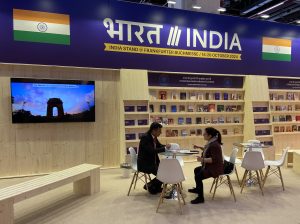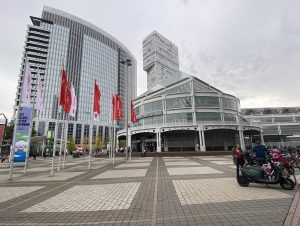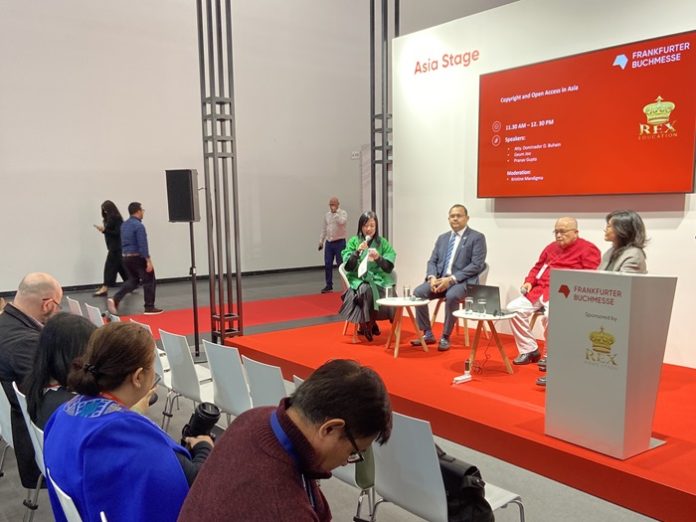Books are the magic carpet.
– Patrick Howard
In the 30 years that I have attended the Frankfurt Book Fair, the fairgrounds have seldom been as calm as at this year’s edition, particularly during the three days reserved for industry professionals. One could walk almost all the aisles without bumping into the usual large crowds gathering around an exhibitor booth or another. The five days of the fair were attended by some 230,000 visitors, of whom about half were trade visitors, i.e., more or less the same number as last year.
With 4,079 stands, the number of exhibitors also appeared to have reached a fairly stable base again, albeit shrunk by around 40% as compared to most of the pre-pandemic years. The book industries from Asia-Pacific occupied a little over ten percent of the booths, 460 in total (i.e., around 100 less than last year), including 69 from India, 121 from mainland China, 83 from Hong Kong, 41 from Japan, 36 from South Korea, 33 from next year’s Guest of Honor, the Philippines, 24 from Singapore, 15 from Indonesia, Malaysia, Taiwan, Vietnam, Bangladesh and Pakistan, and 38 from Australia and New Zealand.
Among the exhibitors from India, there were 45 publishers and book dealers, 14 digital service providers, 6 printing houses, and one literary agency (Red Ink). Three industry organizations (NBT, Capexil and the Chennai International Book Fair) had exceptionally large collective booths representing another few dozen publishing houses and other institutions (ICSSR, ISCS, Urdu Council, Sahitya Akademi) under the slogan “We, the People of India…” taken from the Preamble of the country’s Constitution.

For the first time, the Frankfurt Book Fair instituted an Asia Stage, where, on all five days of the fair, readings and debates were held by authors from various Asian regions including India. The events addressed issues such as the trends and developments in Asia’s book markets with regard to women’s voices, graphic novels, science fiction and collaboration projects across Asia. Many of the discussions centered around the same issues as elsewhere at the fair: censorship, the impact of TikTok and other social media on book sales, the use of artificial intelligence in the various book production processes, the influence of ChatGPT on new businesses, etc. Not to forget the latest marketing invention of a ‘new adults’ readership category targeting current feminist, gender identity and ecology trends.
Prior to the setup of this feature, the book fair had organized a Publishers’ Trip India for independent publishers from German-speaking countries interested in translations into and from Indian languages. Funded by the German Foreign Office as one of FBF’s 15 fellowship and grant programs, the publishers had the opportunity to meet with Indian publishers at the Jaipur Literature Festival, and the Publishing Segment Bookmark during a stay in Delhi.
Another new feature at the fair was the Games Business Centre organized by both the Frankfurt Book Fair and the Bologna Children’s Book Fair in order to expand their existing film and licensing offerings, with daily trade events focusing on cross-media rights business opportunities and a one-off Book-to-Screen Day bringing together filmmakers and publishers.
The Comics Business Centre had a particular focus on comics and graphic novels from Asia, particularly Korea and next year’s Guest of Honor the Philippines. The Frankfurt Audio Area was twice as large as last year, with exhibitors presenting audio books, audio services, software, podcasts and the like, and stage debates animated by speakers from Penguin Random House, Bonnier, Audible and BookBeat.
In addition to the annual Frankfurt Rights Meeting, a Children’s Book Conference and the fair’s usual ‘cultural-political’ program of various debates, the core of FBF2024’s business activity remained the Literary Agents & Scouts Centre, where all of its 540 tables were fully booked, hosting 320 agencies mainly from the UK, USA, Germany, Sweden and this year’s Guest of Honor Italy.

As to the situation in the world and particularly the war in the Middle East, the fair organizers succeeded in keeping political debates down to less controversial statements than last year’s – even though some of the publishers and service providers from the Middle East and Turkey as well as some dispersed activists had subtle ways of showing their solidarity with the Palestinian people, both with their publications and the exhibition of Palestinian kheffiyes (Palestinian flags were forbidden) at their booths.
At the fair’s opening ceremony, FBF Director Jürgen Boos had anticipated a more tense atmosphere, such as last year’s boycott by Arab publishers due to his biased stance on Israel, which he tried to tune down a bit this time when he stated, “It goes without saying that many differing viewpoints and opinions are coming together – especially in the light of the ongoing geopolitical conflicts worldwide.”
The next Frankfurt Book Fair has been planned for 15-19 October 2025, with a focus on the Philippines’ book industry.

















